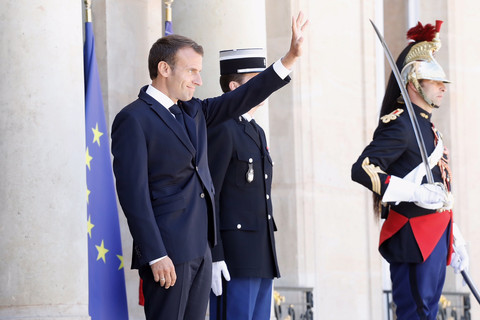[ad_1]
Most EU states are sending their ambassadors to Russia’s WW2 victory parade on Sunday (9 May) despite tense relations.
The list includes: Belgium, Bulgaria, Croatia, the Czech Republic, Denmark, Finland, France, Germany, Greece, Hungary, Ireland, Italy, Luxembourg, Poland, Portugal, Romania, Slovakia, Slovenia, and Sweden.
The Dutch ambassador is also expected to go, but had not confirmed as of Friday.
Austria, Cyprus, and the EU embassy in Moscow are sending chargé d’affaires.
The three Baltic states and Spain are not sending anyone.
Malta did not reply to EUobserver.
In Cold War times, Western analysts used to study who sat close to the Soviet leader at the annual event to try to understand Moscow’s opaque power structures in a practice called “Kremlinology”.
But the 2021 guest list also gives a snapshot of how EU states feel about Russia relations.
These took a nosedive in 2014 when Russia invaded Ukraine, triggering EU sanctions.
They got worse recently, when the EU imposed sanctions over Russian violence against opposition leader Alexei Navalny and Russia blacklisted the EU Parliament president in revenge.
The Czech Republic and Russia also expelled dozens of each other’s diplomats after revelations that Russian spies blew up a Czech arms depot in 2014, killing two people.
But Berlin, in any case, always sends a VIP to the Red Square on 9 May because of Nazi Germany’s role in WW2, an EU diplomat noted.
The fact the Czech ambassador is going indicates Prague wants to mend ties despite the Russian attack.
Meanwhile, Austria, Cyprus, Spain, and the EU embassy’s decisions not to send top people mean little, because these were due to logistical reasons.
The EU ambassador is not in Moscow on the day, for instance.
But the Baltic states are boycotting the event for political motives, diplomatic sources said.
Lithuania’s ambassador will place flowers on the tombstone of the Unknown Soldier in Moscow on 8 May instead.
And his gesture was meant “to honour the victims of all the nations that fought in WW2, civilian and military,” an EU diplomat noted.
“For a number of countries, this [9 May] is an important date and they appreciate the undeniable role the Soviet Union played in defeating the Nazis,” another EU source said.
“Ambassadors cannot escape from an invitation to attend such an event – it’s a matter of courtesy and actually their duty to come – unless bilateral relations are so bad that they couldn’t care less,” the source added.
Last year, the Austrian, Bulgarian, Croatian, Czech, French, and Italian presidents or prime ministers, as well as the Grand Duke of Luxembourg, were planning to go.
But the parade was cancelled due to the pandemic and, in the end, the Hungarian foreign minister was the only EU politician who went to a mini-event held on 24 June.
Spin?
This year, the Kremlin said it had not invited any big names because the 76th anniversary was less important than the 75th.
“This year is not a [major] anniversary year, so we don’t intend to invite foreign participants,” Kremlin spokesman Dmitry Peskov said in April.
But the EU source indicated that this was spin designed to minimise a potential “snub”.
“Presence at the level of an ambassador is always the lowest official representation possible, so this is also a sign,” the source said.
“This is a snub for the Russians. Although they will try to present it as EU member states attending,” he added.
The 2021 parade is to involve 12,000 soldiers, 190 combat vehicles, 53 warplanes, and 23 helicopters, according to Russia’s Tass news agency.
This includes ‘S-400’ anti-aircraft systems, which Russia installed in Crimea after seizing the peninsula from Ukraine.
It also includes nuclear-capable ‘Iskander’ missiles, which Russia recently installed in its Kaliningrad exclave, putting them in range of Warsaw and Berlin.
Iskanders
And for some Western observers, Russian president Vladimir Putin’s parades have come to look more like propaganda for future conflicts than a celebration of post-WW2 peace.
Recalling a 9 May parade shortly after Russia invaded Ukraine, Robert Pszczel, a former Nato spokesman in Moscow, told EUobserver back in 2015: “I don’t have a problem with kids cheering when they watch their country’s tanks go by”.
“But I do have a problem when the biggest cheer, the kind you hear at a hockey match, comes when they see the Iskanders go by,” Pszczel said.
“The West is dealing with a leader [Putin] who is bored by domestic politics, driven by a big but touchy ego, dreaming of his huge role in history, progressively emboldened by the short-term successes of his brinkmanship, and unchained from the restrictions of political, legal, and moral accountability,” Pszczel added in an op-ed for British think-tank Rusi on Saturday.
[ad_2]
Source link
